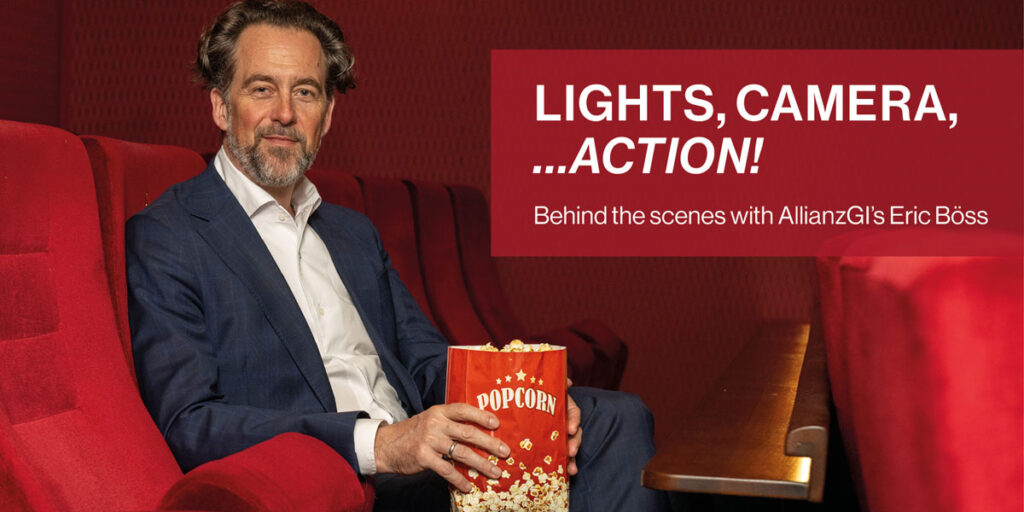
If the company’s trading desk was a film set, Eric Böss would be its director. The global head of trading at Allianz Global Investors (AllianzGI) has a passion for obscure cinema, and in this issue’s cover interview he explores the intersection between art and reality – and the ongoing metaphor between movies and the markets. With Global Trading editor Laurie McAughtry also a horror movie fanatic (what are the chances?) the conversation fell down some interesting rabbit holes…
“Being a head trader is a little like being a director of a movie because you’re running a set, with a complex cast of characters – and you always have the producer keeping an eye on you. Who’s the producer? The portfolio manager and the clients, of course – they want results, in time, and error free. Growing up in the 80s, I wasn’t able to watch all the scary movies that were released back then, but I’ve made up for it since,” says Böss.
“You mustn’t be afraid to dream a little bigger, darling” – Inception, 2010
So how did a mountain-biking fan with a passion for movies fall into trading in the first place? Entirely by accident, because he was not sure which path to pursue when he left school. “In the 2020s, I probably would have travelled for a year doing things that are fun but don’t pay bills. Back in Germany in the early 90s, doing a two-year apprenticeship in a bank sounded like a smart idea.”
Although Böss had many other interests, including history, chemistry, and literature, his story started with a bank apprenticeship in his hometown of Frankfurt, which led to asset management… and he never left.
Böss traded derivatives for almost 20 years, almost to the day, before being asked to take on the role of head of trading in 2016. “I always joke that this is probably the shortest CV in the industry.”
But two decades of derivatives gave him a wealth of experience and a deep pool of diversity to draw on. “I get bored quickly, but this industry keeps you on your toes. Most of the jobs that I looked at when I was younger wouldn’t have kept me interested for 30 years like this one.
“Derivatives are usually an area which leads to interesting careers because they don’t really have a home. In the 90s especially, they were seen as a little exotic, as if we were doing black magic. Nowadays they are much more mainstream. But when we were first building it out, it was an opportunity to explore all the underlying asset classes and markets – it offered me the broadest range available in trading, which is what kept me engaged.”
“The saddest journey in the world is the one that follows a precise itinerary” – Guillermo del Toro
“In a way, some parts of my career have to some extent been driven by chance – or you could call it lucky coincidence. I had touch points with every asset class over 20 years, which is what, to some extend, led me to running trading across all assets now.”
It could have gone a very different way though. “Many crucial decisions don’t look crucial when you take them. In the aftermath though, they crystallise into crossroads,” says Böss, who at one point considered leaving trading to move into portfolio management or to the sell-side. Both decisions would have led to very different career paths, but Böss does not regret his decision.
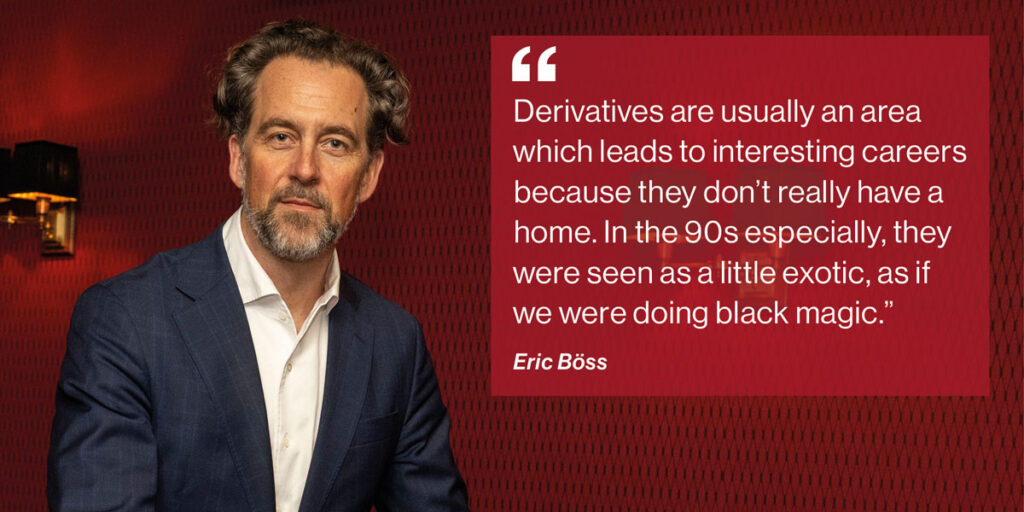
“Small decisions can make a big difference, even if you don’t think so at the time. I think people who are successful frequently boast about how good they are and how well they planned things when actually, many careers have points where it’s all about luck – when it’s not in your hands any longer, it’s just an illusion of control.”
“Pay no attention to that man behind the curtain” – The Wizard of Oz, 1939
So how does the movie metaphor play into all this? Right from the start, there is of course a clear comparison between the move from analogue to digital in films, and the move from pit to electronic in trading, which started with FX in the 1980s.
“Movies are over 100 years old now, and they’ve come a long way – from silent, black and white, to colour, to Technicolor and CinemaScope. In the 80s, they started to use videos instead of celluloid, which changed everything. You could shoot a movie with a hand camera.”
For example, Quintin Dupieux, a French film-maker and electronic musician, shot his first film (the 2010 horror-comedy Rubber, about a homicidal car tyre) entirely on a Canon 5D DSLR.
“The technology might have changed, but they are still movies. It’s the same with trading. We’re doing exactly the same now with algorithms as we used to do in the pit trading days, trying not to be run over. Totally different toolkits, exactly the same game. It’s still a movie.”
“You’re gonna need a bigger boat” – Jaws, 1975
These days, Böss runs a team of 37 traders globally including 20 in Frankfurt, ten in Hong Kong, two in London and four in New York. His approach to trading has always been a focus on communication and technology – “in that order”.
“The link between portfolio managers and traders must be as close as humanly possible. The traders need to represent and understand what a PM wants – and that means data and communication. And that communication is the base for our contribution to alpha generation.”
As the director, it is crucial to manage the set and the cast – and it can be a challenge to curate all the different personalities on set. Böss’s team has a wide variety of passions and interests that he strongly believes contributes to its success. From wine-tasting and horse-racing to endurance running, mountain biking and mountain guiding, it is the mix that works.

“It’s about diversity of mind,” he says. “You need certain ratios. You need a healthy gender balance, you want a good age split, you want different educational and regional backgrounds and so on, but it’s all as a percentage of your overall team. You’re not just starting with a blank piece of paper and when you’re hiring someone, you don’t just run through a list. It’s about what works within the wider cast.”
It is also important to have a pipeline. “It’s like choosing a restaurant when you’re already hungry. That’s the worst time. You need to plan strategically, and then hire when you have the opportunity.”
“People don’t change. Times do” – John Wick, 2014
Back in 1995 when the trading desk was set up, the structure was by asset class: with different teams for equities, fixed income, currency and money markets, and derivatives. It was a classic split with regional focus – and until three years ago, that was how it stayed. But things are changing.
The big move is the disbanding of his dedicated derivatives team, moving the traders back to sit within individual asset classes. “Derivatives are so much more mainstream now. PMs don’t think about cash or derivatives, they think in terms of portfolio construction and risk factors – what’s my duration, what’s my exposure, and how do I manage my portfolio with these factors? The good trader should understand the dynamics of futures and swaps as well as she understands the underlying market.”
That brings up the theme of constant learning rather than siloing expertise into different areas – something Böss feels strongly about. “Across all asset classes, we have a very ‘bottom-up’ house with a lot of different strategies that the traders have to serve, so even though we’re a larger firm on a global basis, I can’t go full specialist and frankly do not want to either. I want the asset class experts to cross-fertilise, which is why we’ve always had all our traders in each region in one big room, which allows for the best possible communication and means they’re surrounded by different influences and have an optimal position to trade interconnected markets.”
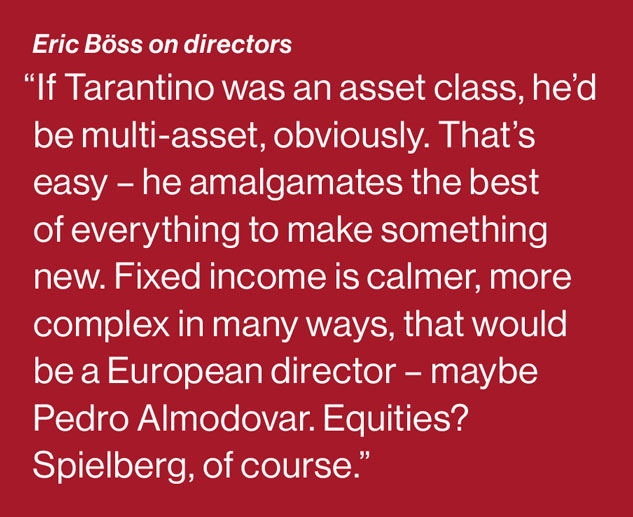
At the end of the day, the trading team has to work for the investment strategies that it serves, and Böss believes his team can make a genuine contribution to alpha generation. AllianzGI is an active asset manager – it doesn’t run passive money. And while some of its strategies are very low turnover, others are nimbler, some are concentrated, others broadly diversified with hundreds of portfolio lines. “Trading does make a difference there,” he says. “The math behind it is pretty simple. If you’re turning over a billion and you can squeeze out one basis point in better execution, you’ve already moved the needle. Traders have to be able to make a difference. Yes, sometimes our strategies are about cost optimisation more than about alpha catching, but there are still a significant number of occasions where it does make a difference.”
It all comes down to strategy, in Böss’s eyes – and he plans his strategies up to three and even five years in advance, in parity with the PMs. “We don’t need to reinvent the wheel because we already know how to trade,” he explains. “Most asset classes are already trading electronically, so we’ve got a set of tools which work very well. It’s how you use them that makes the difference. We’re like the wheels on a car. Yes, the PMs might be the engine but if their wheels are flat, they will have a hard time to perform. And to stick with that analogy: Traders can help to pick the right wheels for a particular race.”
“Everybody is afraid of the unknown” – Wes Craven
On an even higher level, as head of trading Böss has to understand the regulatory environment so that he can position his desk to work with all the different regulators that govern the firm. Combine that with internal accountability and external stakeholders, the demographics of the existing trading team where some have just started in the business while others already traded for decades, and it all comes back to the team structure he creates. The director and the cast.
“We need to bring in the right skill sets and, especially, enable more people to focus on technology. But we also need people who know what to do with that technology, we need traders. Movie-making, just like trading, involves a lot of preparation and coordination. But you never fully know what’s going to happen, and then you have to adapt.”
Böss jokingly compares it to Werner Herzog’s 1982 adventure epic Fitzcarraldo, with Klaus Kinski in the main role – a film beset by a series of misfortunes (one of which ended up with the crew manually hauling a 320-ton steamship up a steep hill, resulting in three injuries), Kinski and Herzog getting at each other’s throats almost literally, and indigenous Amazonians attacking the set.
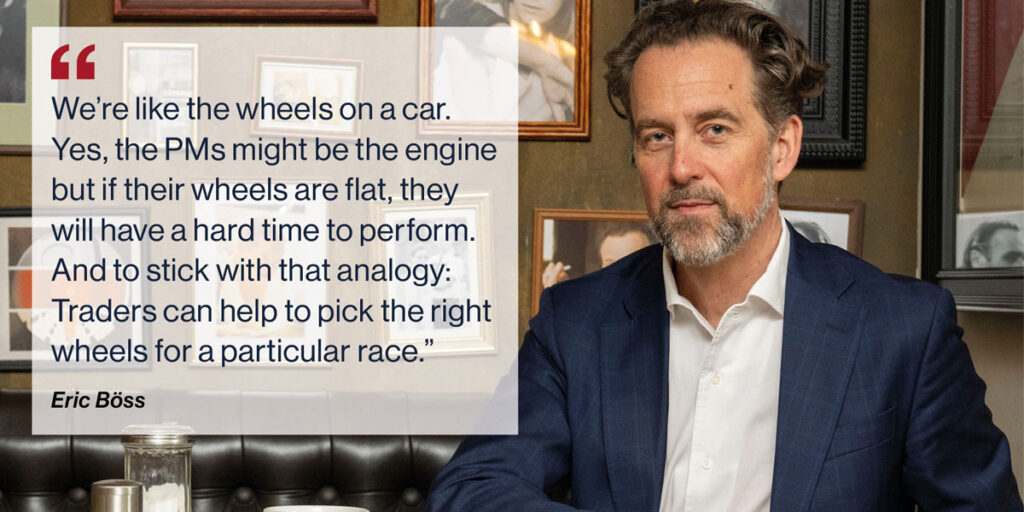
“Psychological safety for my team to do their job in a very stressful environment is paramount,” he says. “They need the right attitude, training, the right equipment and the right support.”
“We imagine a future… and our imaginings horrify us” – Oppenheimer, 2023
As head of desk, however, it is important to maintain perspective. “When you’re running a trading team of this size in an organisation as large as ours, if you’re too deep in the weeds then you’re doing something wrong. We have to position trading strategically for the longer term.”
Given that AllianzGI is a global asset manager with a very strong European footprint, the firm has a lot of skin in the game when it comes to the future of Europe’s capital markets – and right now, Böss is not feeling optimistic.
“We run a lot of European assets and the fact is that European equity turnover is getting lower and lower, especially in comparison to the US. European companies are just not listing in Europe anymore. We need to urgently look at what can be done on the regulatory side to support our markets because currently, Europe’s equity markets are home to great companies, but stuck in a vicious cycle of lower turnover, fewer IPOs and a less transparent market structure than the US, which is not helping the capital markets union nor the financial industry. No one wants to be the person to stand up and say it, but people are getting frustrated.”
It is like the dominance of the US in the world of cinema, suggests Böss, except the other way round. These days, cinema is branching out and expanding into diverse regional market – no longer is Hollywood the centre of the movie universe. “You’ve got Bollywood, which is the biggest in the world now. You’ve got Nollywood (Nigeria, the world’s faster-growing film industry), which is already bigger than Hollywood. You’ve got Netflix, which is taking regional productions global.”
By comparison, the US remains the largest capital market in the world, with a virtuous cycle where liquidity begets liquidity partly due to its large retail base and more capital backed retirement system. So how do we stem this bleeding out of liquidity from Europe?
“The biggest problem is that we don’t just have one European capital market, we have 27 of them. Most market regulations are handed down to national competent authorities, and that makes them harder to access and much less transparent. We still don’t have a consolidated tape, though that may finally come to pass in two years, which means that if you’re an outside observer, it’s very difficult even to know what’s being traded in Europe. Capital mobilisation is another big issue, and the retail investor situation currently has a lot of upside, given its low share of trading volumes. Our politicians could perhaps take a lesson from the Nordics, which had a very successful shift towards a system supporting private savings in capital markets.”
“Cinema is a medium that can translate ideas” – David Lynch
Looking to the future, Böss believes that how a desk can handle data will be crucial to its survival. Part of his current rebuild is the creation of a new tech team to do exactly that – moving a current trader to run a dedicated team on the trading floor to support and build out trading technology to underpin the evolution of the desk.
“Again, it’s like the switch from analogue to digital. What we’re seeing now is behavioural change – similar to when we introduced Excel and Office into our workflows back in the 90s. The technology we’re seeing now has been around for years, but it is becoming increasingly commoditised and easier to use, so not doing so would quickly become a competitive disadvantage.
“Data science and large language models are to some extent buzzwords, but both technologies have huge potential, and we try to deploy them where it makes sense. In many cases the economics do not add up since either the data or the tools are too expensive, but one can’t ignore those technologies, it is part of preparing for the future or just evolution if you will.
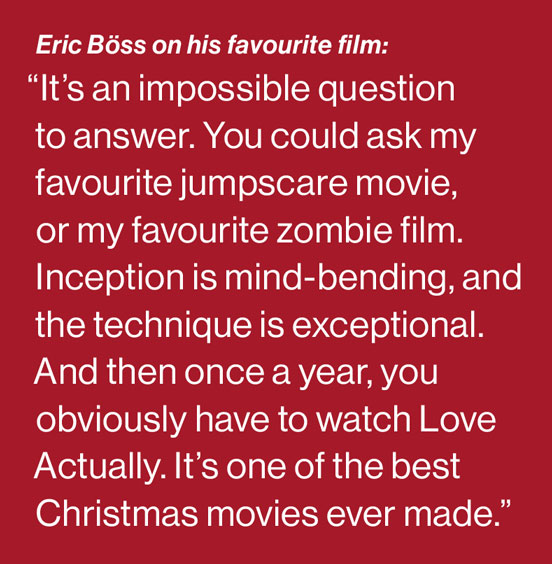
“I think in ten years we could see the same number of traders but ten times the volumes managed by them, so we need to be able to effectively process ever larger quantities of trades without compromising quality. What traders will need to be able to do so, is use new toolkits to make decisions.
“Once equipped with the right technology, human traders will still be better than just AI alone. Films like The Matrix and Ghost in the Shell immediately come to mind – androids beat robots any time.”
“Why don’t we wait here a little while and see what happens?” – The Thing, 1982
Over the last three decades, Böss has seen a lot of things (and we’re not just talking about movies). So what has he learned?
“Capital markets are ultimately more art than science. We do a lot of math but those are just models used to represent the reality around us. That’s why computers are still not the best investors. Markets are constantly changing based on the society that interacts with it. My job allows me to observe and analyse all those developments, just through the lens of what they do with their money, how they invest and consume. Does it get more interesting than that?
“It’s very similar to a director looking through the lens of a camera. After 30 years of watching horror movies, I thought I was pretty hard to shock – but I could be wrong.”
©Markets Media Europe 2024

